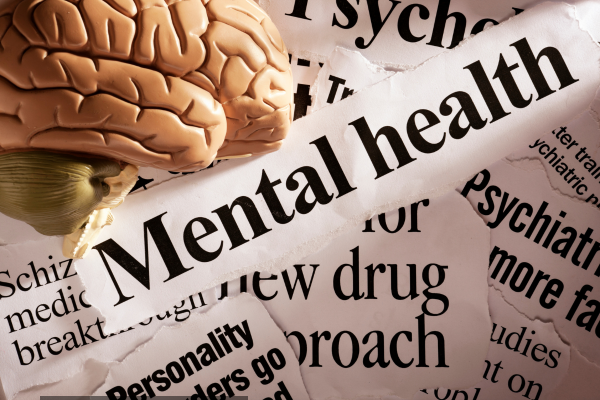Why Mental Health Matters
Mental health is just as important as physical health. It impacts your thoughts, emotions, and behaviors. When neglected, poor mental health can lead to stress, anxiety, or even depression. Incorporating simple, daily habits can make a big difference in maintaining balance and promoting happiness. These habits don’t require drastic lifestyle changes, just a commitment to consistency and care.
The Power of Journaling for Mental Clarity
Journaling is a simple yet effective way to improve mental health. It allows you to organize thoughts and process emotions. Writing down your worries or achievements can ease mental tension and boost self-awareness. Journaling also helps you recognize patterns in your feelings, making it easier to understand triggers and responses. Start with five minutes a day to write about how you feel or what you’re grateful for. Over time, it can become a powerful tool for self-reflection and emotional release.

Mindfulness: Living in the Present Moment
Mindfulness is the practice of being present and aware. It reduces stress by helping you focus on the current moment instead of worrying about the past or future. Incorporating mindfulness into daily routines can improve your overall well-being. Simple activities, like focusing on your breathing or savoring your meals, can make a huge difference. You don’t need long meditation sessions; just a few minutes of mindfulness can help clear your mind and create calmness.
Regular Exercise: A Natural Mood Booster
Exercise is not just for physical fitness; it also improves mental health. Physical activity releases endorphins, chemicals in the brain that act as natural mood elevators. Even light activities, such as walking, can lower stress levels and improve sleep quality. Aim for at least 30 minutes of movement daily. Choose activities you enjoy, like yoga, dancing, or cycling, to make exercise a sustainable habit. Over time, it will become an essential part of your mental wellness routine.
Prioritizing Sleep for Emotional Resilience
Sleep is a cornerstone of mental health. Without adequate rest, your mind struggles to function properly. Sleep deprivation can increase irritability and reduce your ability to manage stress. Develop a consistent sleep schedule by going to bed and waking up at the same time every day. Rest and dream easily with Yin Yang Infusions Night time products Avoid screens an hour before bedtime to help your mind relax. Creating a calming bedtime ritual, such as reading or meditating, can significantly improve your sleep quality and mental resilience.
Healthy Eating for a Balanced Mind
What you eat has a direct impact on your mental health. A balanced diet fuels your brain and supports emotional stability. Foods rich in omega-3 fatty acids, like salmon or walnuts, are known to improve mood. Fresh fruits, vegetables, and whole grains provide essential nutrients for brain function. Limit processed foods and sugar, which can lead to mood swings and fatigue. Staying hydrated is equally important, as dehydration can cause confusion and irritability.
The Importance of Social Connections
Humans are social beings, and building strong relationships is vital for mental health. Sharing your feelings with trusted friends or family members provides emotional support. Even brief conversations with loved ones can uplift your mood. If you feel isolated, consider joining a club or volunteering in your community. These activities create opportunities to connect with others, reduce loneliness, and build meaningful relationships that contribute to happiness.
Managing Stress Through Relaxation Techniques
Stress is a normal part of life, but it needs to be managed effectively. Relaxation techniques, such as deep breathing or progressive muscle relaxation, can reduce stress levels. Spend a few minutes each day practicing controlled breathing by inhaling deeply and exhaling slowly. Guided imagery, where you visualize calming scenes, is another powerful method. Over time, these practices help you develop resilience and a sense of calm during challenging times.Guided Meditation & Hypnosis Audios
Self-Care as a Daily Priority
Self-care involves taking deliberate steps to nurture your mind and body. It could be as simple as enjoying a hot bath, reading a book, or spending time in nature. Self-care is not selfish; it replenishes your energy and allows you to show up better in life. Schedule time for activities that bring you joy and relaxation. Treat self-care as a necessity, not a luxury, to maintain balance and well-being.

Building a Routine for Lasting Benefits
Consistency is key to reaping the benefits of these habits. Start small by incorporating one habit at a time. Once it becomes part of your daily routine, add another. For example, begin with a five-minute journal session in the morning and add a short walk in the evening. Over time, these small actions add up, creating a strong foundation for mental health and happiness.
Conclusion: Small Habits, Big Impact
Improving mental health doesn’t require monumental changes. It’s about integrating small, consistent actions into your daily life. Whether it’s journaling, practicing mindfulness, or prioritizing sleep, every step counts. By focusing on these simple habits, you can reduce stress, enhance happiness, and build resilience. Mental health is a journey, and the path begins with the choices you make today.

Similar Posts
- 5 Ways to Practice Gratitude Daily
- Top 10 Relaxation Techniques for Stress Relief
- How Exercise Can Improve Mental Health
- Mindfulness Practices for Everyday Life











